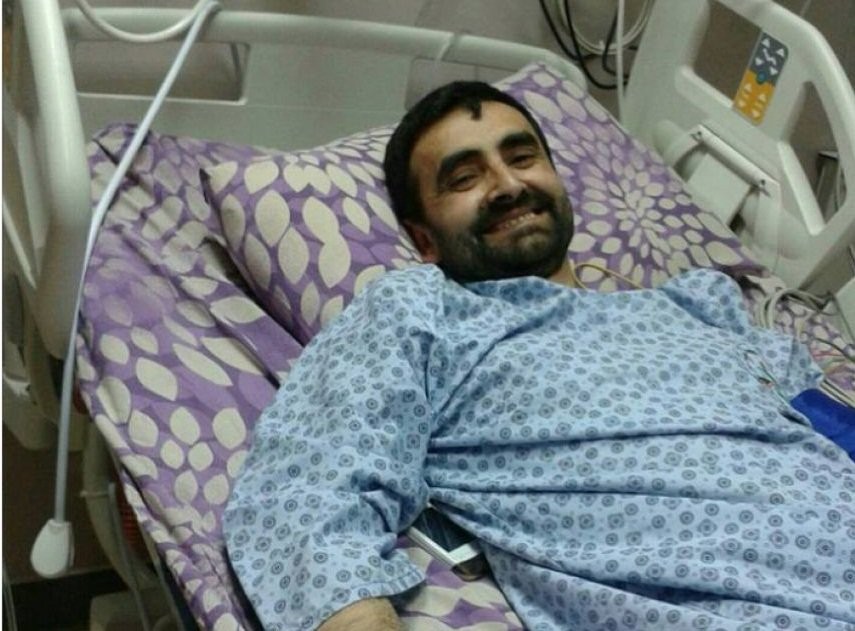
Palestinian prisoner Bassam Sayeh, 44, is suffering a serious deterioration in his health, and he was taken to intensive care on Tuesday, 6 August. Sayeh, imprisoned in Israeli jails since 8 October 2015, suffers from bone cancer and leukemia and chronic heart problems. After being repeatedly transferred to the Ramleh prison clinic, he was finally transferred to the civilian Afula hospital after his health deteriorated further.
Sayeh, from Nablus, is unable to eat and has reportedly lost consciousness. He is considered to be one of the most severely ill Palestinian prisoners, and his heart, liver and lungs have been weakening since his imprisonment. He suffers from heart failure, pulmonary congestion and an enlarged liver, and his lungs function at only 25% of normal capacity. He is sentenced to life imprisonment and an additional 30 years. He was accused of participating in supporting a resistance operation against Israeli settlers. Sayeh was seized by occupation forces as he went to the Salem military court near Jenin for the hearing of his then-imprisoned wife Mona.
Sayeh was denied visits from his wife Mona for almost three years, and only saw her for the first time since his arrest in January 2018. He has suffered from bone cancer since 2011 and leukemia since 2013. Mona Sayeh said that despite his illness, he had been repeatedly subjected to crackdowns and mistreatment by Israeli jailers accusing him of having a cell phone.
During his time in Israeli prison, Sayeh has struggled for access to necessary surgery and has dealt with interference with chemotherapy as well as denial of access to independent specialist doctors. Sayeh’s health situation is one of the most severe inside Israeli prisons, but medical neglect is a significant issue for many Palestinians. 220 Palestinians have lost their lives inside Israeli jails, many in cases connected to medical neglect, like that of Nasser Taqatqa in July 2019.
There are at least 23 Palestinian prisoners with cancer and around 100 seriously ill prisoners. In the past, Palestinian prisoners have died shortly after their release, reporting long-delayed testing and treatment during their time in Israeli prisons.
Palestinian prisoner Bassam Sayeh, 44, is suffering a serious deterioration in his health, and he was taken to intensive care on Tuesday, 6 August. Sayeh, imprisoned in Israeli jails since 8 October 2015, suffers from bone cancer and leukemia and chronic heart problems. After being repeatedly transferred to the Ramleh prison clinic, he was finally transferred to the civilian Afula hospital after his health deteriorated further.
Sayeh, from Nablus, is unable to eat and has reportedly lost consciousness. He is considered to be one of the most severely ill Palestinian prisoners, and his heart, liver and lungs have been weakening since his imprisonment. He suffers from heart failure, pulmonary congestion and an enlarged liver, and his lungs function at only 25% of normal capacity. He is sentenced to life imprisonment and an additional 30 years. He was accused of participating in supporting a resistance operation against Israeli settlers. Sayeh was seized by occupation forces as he went to the Salem military court near Jenin for the hearing of his then-imprisoned wife Mona.
Sayeh was denied visits from his wife Mona for almost three years, and only saw her for the first time since his arrest in January 2018. He has suffered from bone cancer since 2011 and leukemia since 2013. Mona Sayeh said that despite his illness, he had been repeatedly subjected to crackdowns and mistreatment by Israeli jailers accusing him of having a cell phone.
During his time in Israeli prison, Sayeh has struggled for access to necessary surgery and has dealt with interference with chemotherapy as well as denial of access to independent specialist doctors. Sayeh’s health situation is one of the most severe inside Israeli prisons, but medical neglect is a significant issue for many Palestinians. 220 Palestinians have lost their lives inside Israeli jails, many in cases connected to medical neglect, like that of Nasser Taqatqa in July 2019.
There are at least 23 Palestinian prisoners with cancer and around 100 seriously ill prisoners. In the past, Palestinian prisoners have died shortly after their release, reporting long-delayed testing and treatment during their time in Israeli prisons.




